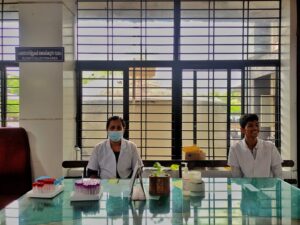
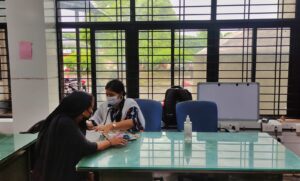
At the heart of a tertiary care facility, the Emergency Department takes precedence, providing swift and
attentive care to those in urgent need. Within the esteemed TD Medical College, the medicine
emergency unit operates seamlessly, ensuring uninterrupted services 24/7. Renowned for its exceptional
level of care, it stands as a premier destination for treating critically ill patients and nurturing the
development of postgraduate scholars in emergency management.
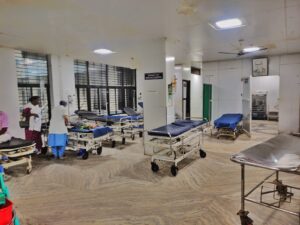
Patients from all corners of Kerala, particularly from the districts of Alappuzha, Ernakulum, Kollam,
Pathanamthitta, and Kottayam, are referred here when in need of expert tertiary care. The casualty ward
boasts 16 beds, each equipped with centralized oxygen, portable defibrillators, standard ventilators, and
basic monitoring systems for every patient. Sick individuals are stabilized within the casualty ward before
being transferred to dedicated wards, while extremely critical patients are promptly shifted to the
Medicine ICU.
The casualty ward also houses essential facilities such as a resuscitation room, nursing station, on-site
blood collection center, ECG machine, and X-ray equipment. A triage system is in place to efficiently
categorize patients based on their level of sickness. During each session, one duty medical officer, two
postgraduates, and two house surgeons are assigned to provide care. Postgraduates receive daily
instruction on the fundamentals of emergency medicine, including ACLS (Advanced Cardiac Life Support)
and BLS (Basic Life Support), from trained medical officers. Within two months of joining the institute, all
our postgraduates become proficient in emergency resuscitation, intubation, ventilator management,
and fluid and ionotropic therapy.
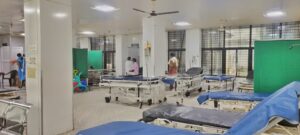
Cases requiring specialized care, such as strokes (neurology), intracranial bleeding (neurosurgery),
myocardial infarctions, arrhythmias (cardiology), and dialysis (nephrology), are swiftly transferred to
respective departments from the casualty ward once the patients are stabilized.
A normal day in medicine casualty of TDMC, Doctors receive patients with
Cardiology – MI,NSTEMI, AF, SVT,Bradyarrythmias ,Complete heart block( degenerative and secondary to
poisoning , hypertensive Emergencies, Pulmonary edema , Cardiogenic shock, Heart Failure , Pericardial
effusion, tamponade , pulmonary embolism and DVT, aortic aneurysm , aortic dissection
Respiratory – respiratory failure, COPD /Asthma ,bronchiectasis exacerbation,Cor pulmonale, SARI,
Pneumonia , effusion and pneumothorax , Ards,IlD,ABPA, abscess, TB, (Hemoptysis), malignancy.
Infections – Sepsis , Sirs , Mods , lepto ,dengue, malaria ,IM , Typhoid, myocarditis , filariasis
Endocrinology – DKA,HHS myxoedema coma, hypo/ hypercalcemia , Addison’s , parathyroid storms .
Haematological – severe, Anemia, pancytopenia, febrile neutropenia, Sickle cell crisis ,AIHA, multiple
myeloma, lymphomas and leukaemia’s ,coagulopathy, MAHA, DIC ,porphyrias,tumour lysis syndrome
Dermatology– adverse drug reaction, dermatological emergency like SJS , TEN
Rheumatology – SLE , All vasculitis and Inflammatory muscle diseases
Gastroenterology – UGI bleed , Gastroenteritis , IBD, acute fulminant hepatitis, HPS, SPB, Hepatic
encephalopathy, DILI, pancreatitis.
Nephrology – AKI, A/c on CKD, glomerular , tubular diseases, complicated UTI ,pyelonephritis ,metabolic
/ uremic encephalopathy Hypo/ hyper (natermia / kalemia , met,resp ( acidosis , alkalosis)
Neurology – Thromboembolic stroke, IC bleed, SAH, aneurysmal rupture, delirium epilepsy,/status
epilepticus, CVT, Migraine ,meningoencephalitis , transverse myelitis, GBS, myasthenia gravis
Toxicology – Paracetamol and all other tablet poisoning, Cerbera odollum , Organophosphorus poisoning
, opioid / alcohol overdose, hypnotic overdose, rodenticide poisoning , Snake bite.
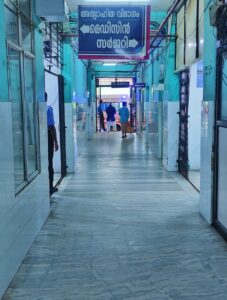
Medical students are also taught SPIKES protocol for Breaking Bad News and writing death summary .
Under the expert guidance of the Head of the Department and dedicated medical officers, both
postgraduates and undergraduates receive comprehensive training in the management of every
emergency situations.